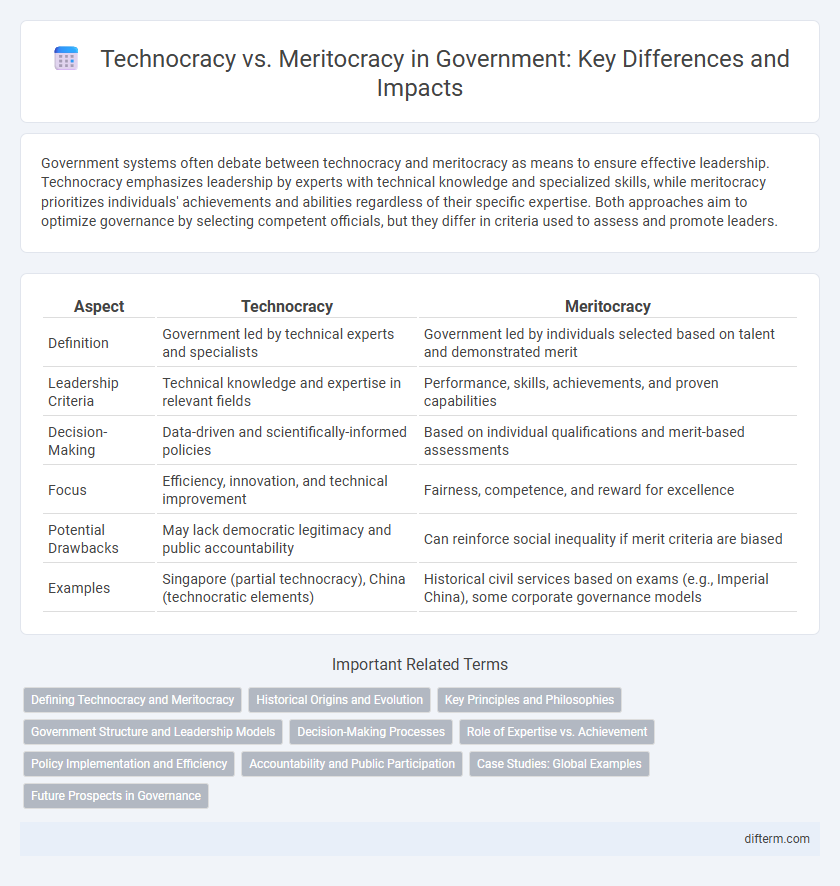Government systems often debate between technocracy and meritocracy as means to ensure effective leadership. Technocracy emphasizes leadership by experts with technical knowledge and specialized skills, while meritocracy prioritizes individuals' achievements and abilities regardless of their specific expertise. Both approaches aim to optimize governance by selecting competent officials, but they differ in criteria used to assess and promote leaders.
Table of Comparison
| Aspect | Technocracy | Meritocracy |
|---|---|---|
| Definition | Government led by technical experts and specialists | Government led by individuals selected based on talent and demonstrated merit |
| Leadership Criteria | Technical knowledge and expertise in relevant fields | Performance, skills, achievements, and proven capabilities |
| Decision-Making | Data-driven and scientifically-informed policies | Based on individual qualifications and merit-based assessments |
| Focus | Efficiency, innovation, and technical improvement | Fairness, competence, and reward for excellence |
| Potential Drawbacks | May lack democratic legitimacy and public accountability | Can reinforce social inequality if merit criteria are biased |
| Examples | Singapore (partial technocracy), China (technocratic elements) | Historical civil services based on exams (e.g., Imperial China), some corporate governance models |
Defining Technocracy and Meritocracy
Technocracy is a government system where decision-makers are selected based on their technical expertise and specialized knowledge in fields such as engineering, science, and economics. Meritocracy prioritizes the selection and promotion of individuals based on their demonstrated talents, abilities, and achievements, emphasizing competence over political affiliation or social status. Both models aim to enhance governance efficiency but differ fundamentally in criteria for leadership selection--technical skill versus overall merit.
Historical Origins and Evolution
Technocracy originated in the early 20th century, emphasizing governance by technical experts and engineers, particularly during the Great Depression when industrial efficiency was prioritized. Meritocracy, rooted in Confucian philosophy and later Enlightenment ideals, evolved to promote leadership based on ability and performance rather than birthright or wealth. Over time, technocracy influenced modern policy-making with data-driven decisions, while meritocracy shaped civil service systems worldwide by institutionalizing merit-based recruitment and promotion.
Key Principles and Philosophies
Technocracy emphasizes governance by experts with specialized technical knowledge, prioritizing data-driven decision-making and efficiency in policy implementation. Meritocracy values leadership based on individual ability and achievement, where positions of power are earned through demonstrated talent and competence. Both systems aim to improve governance but diverge in their criteria for authority--technical expertise versus meritocratic accomplishment.
Government Structure and Leadership Models
Technocracy emphasizes governance by experts and technical specialists, ensuring decisions are driven by empirical data and specialized knowledge, which enhances policy efficiency and innovation. Meritocracy prioritizes leadership based on individual ability and achievement, promoting a competitive environment that rewards talent and performance in government roles. Both models impact government structure by shaping leadership selection criteria and accountability mechanisms, with technocracy leaning towards centralized expert authority and meritocracy fostering progressive leadership based on merit-based advancement.
Decision-Making Processes
Technocracy prioritizes decision-making by experts with specialized technical knowledge, ensuring policies are grounded in scientific data and empirical evidence. Meritocracy emphasizes appointing leaders based on individual achievements and proven competence, promoting efficiency through recognition of talent and performance. Both systems aim to optimize governance outcomes, though technocracy focuses on expert-driven solutions while meritocracy values merit-based leadership selection.
Role of Expertise vs. Achievement
In government, technocracy emphasizes the role of specialized expertise and technical skills in decision-making, relying on professionals with deep knowledge in fields such as economics, engineering, or public administration. Meritocracy prioritizes individual achievement and demonstrated competence, often measured through performance, credentials, or accomplishments, to determine leadership and influence. The balance between expert-driven policy formulation and merit-based leadership selection shapes governance effectiveness and public trust.
Policy Implementation and Efficiency
Technocracy emphasizes expertise and technical knowledge in policy implementation, often resulting in data-driven decisions that enhance efficiency and reduce bureaucratic delays. Meritocracy prioritizes individual merit and performance, promoting skilled leaders who can adapt policies effectively while maintaining accountability. Combining technocratic precision with meritocratic motivation can optimize government efficiency and improve policy outcomes.
Accountability and Public Participation
Technocracy emphasizes governance by experts with specialized knowledge, enhancing accountability through data-driven decision-making but often limiting broad public participation. Meritocracy prioritizes selecting leaders based on ability and achievements, promoting accountability by rewarding performance while encouraging inclusive public engagement. Effective government systems balance expert input with merit-based leadership to foster transparency and active citizen involvement.
Case Studies: Global Examples
Singapore exemplifies technocracy with its reliance on experts in policy-making, leading to efficient urban planning and economic growth. Germany's meritocratic system emphasizes qualifications and performance in civil service recruitment, ensuring competent governance. Both models demonstrate how integrating expertise and merit-based selection can enhance governmental effectiveness and public trust.
Future Prospects in Governance
Technocracy and meritocracy present distinct future prospects in governance, with technocracy emphasizing decision-making by experts based on data and scientific knowledge, and meritocracy prioritizing leadership selected through demonstrated abilities and achievements. Advances in technology and data analytics may bolster technocratic governance by enabling more efficient and evidence-based policy implementation. Meanwhile, meritocracy's focus on individual capabilities and performance could foster dynamic leadership responsive to societal needs and innovation challenges.
technocracy vs meritocracy Infographic

 difterm.com
difterm.com